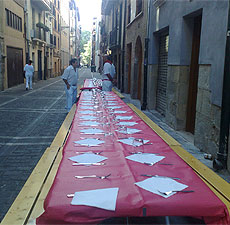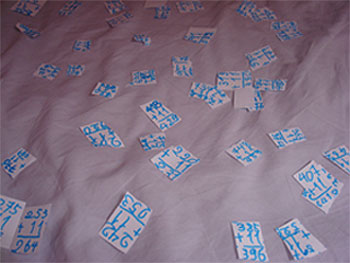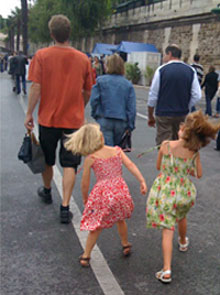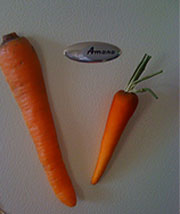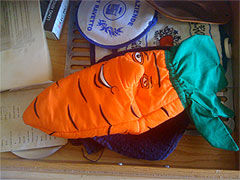I should have arrived earlier. I know better. I’d filled out all the inscription forms to enroll Buddy-roo in the music conservatory weeks ago. I even remembered to phone her pediatrician and request a certificate medicale for
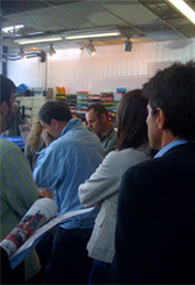 the dance class. He left it posted by the door of his waiting room, her name at the top in doctor’s scrawl, with a perfunctory check in the box for “no apparent contra-indication to practice a sport.”
the dance class. He left it posted by the door of his waiting room, her name at the top in doctor’s scrawl, with a perfunctory check in the box for “no apparent contra-indication to practice a sport.”
I meant to arrive at least an hour in advance, but other errands delayed me. It was 1:15 when I walked into a mob of parents in the main office of the conservatory, all waiting for the registration to start at 2:00. Someone mentioned a list, so I pressed forward to the front desk to put my name on it. I was given #53.
* * *
Two years ago when Short-pants was going into the first grade, the mother of one of her classmates – also a friend of mine – suggested we sign our girls up together for a class at the music conservatory in our arrondissement. I didn’t even know there was such a thing as a local conservatory, let alone at what age you were supposed to start there. I’m really not sure what I’d do without these friends-in-the-know; I am often so often out-of-the-know when it comes to things mothering and things French.
On the opening day of registration, and we rode our bikes over together, arriving thirty minutes before the door was to open, joining a dozen other mothers who had already formed a queue. The process was relatively painless; we handed in our papers and left feeling confident that both girls would get in.
By the end of the summer, I hadn’t received the obligatory self-addressed envelope that I’d included in the application, and Short-pants’ name was missing from the roster posted on the conservatory window. I called to find out why. After much shuffling of paper and several long pauses on hold, I was informed – without much empathy, I might add – that Short-pants was not enrolled in the initiation music class.
“But I was one of the first in line on the first day,” I protested, repeating the date and how I’d arrived early. They had no record of it. She was not on the list. I wanted to scream, but I kept myself in check. This was not the time to need to be right.
“It’s unfortunate,” I conceded, “but how might I enroll her in a class now?”
“Mais non,” I was told, with a fierce cluck of the tongue. “There is no more space in the initiation class. It’s full.”
“But certainly…”
“I am certain, madam.”
My friend – her daughter had fallen off the list, too, but she was quicker than me and got it sorted before it was too late – told me about a woman who’d been in this same situation the previous year and who managed to squeeze her son in by enrolling him in chorale, which did not have a prerequisite course. Once in the system, he was accepted for the initiation course the following year.
Listen, it wouldn’t have been the end of the world if Short-pants wasn’t in music class at the conservatory. There are other places to learn music in Paris. Except it’s a really good program, with a reasonable fee, and if you don’t get in by a certain age, you can’t get in at all. I felt like it deserved at least a college try.
I went to the office in person. I explained my story – three times – to two different people at the main desk, who kept pulling up their computer records and telling me what I already knew, that there was no place for Short-pants. But I kept asking the same question: how could there be no place for her when I was one of the first mothers to arrive on the first day of inscription? (When in doubt, repeat yourself again and again, this I learned from Buddy-roo). Eventually I was referred to the bureau of scolarité.
The Director was apologetic enough, but insisted, as before, that there were no more places in the debutante program. I’d have to wait and enroll my daughter next year.
“Then perhaps you could give me some advice,” I said. “How might I ensure she gets accepted?’
“It’s very simple,” she smiled, “You just come on the first day of registration, and I suggest you come early.” I explained that this was exactly what I had done, but still my daughter hadn’t made the list. She gave me the quintessential French shrug and moved the file folders around her desk, a gesture that I believe was meant to indicate that it was time for me to leave. So I pulled out the wild card.
“I heard that it is possible to enroll in chorale, without the first year of solfège. Is that by any chance true?” (I felt like Columbo, teasing out the truth with a more-or-less innocent question.)
She raised her eyebrows. “Beh, oui, c’est vrai.” She nodded slowly, sizing me up. “En principe, c’est possible.” In principle? Who’s principle? Certainly not hers, since you might note that she didn’t volunteer this option, despite my earlier polite, desperate pleas. I had to ask for it.
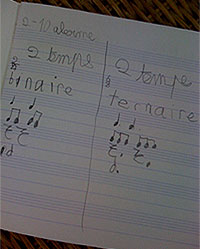
She turned to her computer and typed at the keyboard. She studied the screen. “Alors, let me check.” She ran her finger along the screen, as if counting the students with her fingers, “It’s nearly full.” She typed a few more key strokes. “But there is an opening on Thursday afternoons,” she smiled like it had been her idea, “Would you like to enroll your daughter?”
That’s how Short-pants got in to the Conservatory. The following June an invitation to re-enroll arrived in the mail, and sure enough she had priority status and was instantly assigned to the debutante music class. So this year she took a basic theory as well as chorus. Next year, she’ll start an instrument. She’s thinking about the viola.
* * *
In an unusual breach of custom for French functionnaires, the administrator organizing parents-in-waiting this afternoon was exceptionally friendly, counting off out loud, calling our names and ushering us into the waiting room one at a time when it was our turn. There were three employees receiving us, as well, so it all operated rather efficiently: the examination of the application papers, checking to be sure we’d put postage on our self-addressed envelopes (while I was waiting, a previous mother was told her application would not be considered without an envelope), stamping the date with aplomb on our receipts.
I was given no indication if there will be space for Buddy-roo in either a music or a dance class next fall, just two small strips of paper with official date stamps. But at least this time I can prove I was in line, even though – in the 53rd place – I may not have made it in time.
It still floors me how taking care of these young girls is such a responsibility. It’s much more than loving and feeding; it’s also enrolling them in school, in music classes or theater or judo, keeping track of vaccinations, monitoring homework – even just getting them out the door in the morning and picking them up at the end of the day is a chore that requires concentration. There’s everything to remember to do, so much to be thinking and caring about – let alone just hanging out with them and listening to what they have to say.
I do hold those girls close when they come to me, knowing they won’t want to be close forever. At the same time I dream of the day when they won’t need me anymore. Then somebody always reminds me that by the time they don’t need me, I’ll wish they did. It’s such a paradox, this whole mothering thing. I had no idea, at the inscription, what I was in for.


